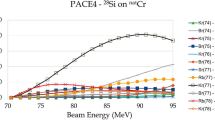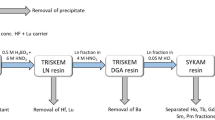Abstract
THE number of different radio-isotopes seems in several cases greater than can be explained by attributing to each of them a different mass-number. In particular, bromine irradiated with neutrons, γ-rays and deuterons gives four radio-isotopes (T = 7 min., 18 min., 250 min. and about 36 h.); and it seems that two of them, namely, the isotopes with T = 18 min. and T = 250 min., must have the same mass-number 801). These facts, together with some others, have led several authors to assume the existence of isomeric nuclei.
This is a preview of subscription content, access via your institution
Access options
Subscribe to this journal
Receive 51 print issues and online access
$199.00 per year
only $3.90 per issue
Buy this article
- Purchase on Springer Link
- Instant access to full article PDF
Prices may be subject to local taxes which are calculated during checkout
Similar content being viewed by others
References
Bothe, W., and Gentner, W., Z. Phys., 106, 236 (1937).
Fleischmann, R., Z. Phys., 107, 205 (1937).
Author information
Authors and Affiliations
Rights and permissions
About this article
Cite this article
SOÅTAN, A., WERTENSTEIN, L. Isomeric Radio-Isotopes of Bromine. Nature 141, 76 (1938). https://doi.org/10.1038/141076a0
Published:
Issue Date:
DOI: https://doi.org/10.1038/141076a0
This article is cited by
-
Zur Kernisomerie beim Rhodium
Die Naturwissenschaften (1938)
Comments
By submitting a comment you agree to abide by our Terms and Community Guidelines. If you find something abusive or that does not comply with our terms or guidelines please flag it as inappropriate.



